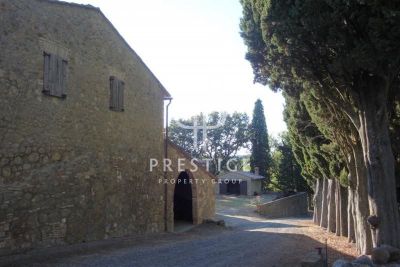San Gimignano is an historical, walled city in Tuscany, Italy, widely known for its medieval architecture, unique towers and one of the finest wines in all of the country.
So small that one cannot drive within its historical walls, the town is nonetheless bursting with character and our extensive collection of San Gimignano property is in high demand. Situated on the top of a hill, this medieval fort town offers incredible views over the rolling Elsa valley, studded with olive groves and vineyards - a fine snapshot of Tuscany. Situated halfway between Pisa and Siena, one could not ask for a more prime location.
San Gimignano's defining feature is, by far, its monumental towers that one can see on the horizon from many kilometres away. Built by merchant and banker families in a spree of one-upmanship, these towers once dominated the town's skyline even more than they do now. At their peak, there were seventy-two towers compared to today's fourteen; most were demolished as a result of power squabbles until only the ones we see today remain. Some of the towers have been converted into stylish modern apartments, making them some of the most prestigious and expensive San Gimignano property.
The town was founded in the 3rd Century BC by the Etruscans as a small village, and was named Silvia when the Romans settled. San Gimignano derives its name from Saint Geminianus, the bishop of Modena, who protected the town from invading Huns. The Middle Ages saw the town's prosperity as a waypoint for pilgrims on the way to Rome and has hosted several prominent figures in history, such as Sigerico, the Archbishop of Canterbury, who walked its roads on the way to England from Rome. In 1199, San Gimignano became independent from the bishops of Volterra, though it was conquered by the Florentine Guelfs, who tore the walls down, though they were rebuilt in 1261 when the Ghibellines regained power. These are the walls that remain.
Owners of San Gimignano property and travellers alike have described the town as having a unique atmosphere as a centre of culture and has been home to lovers of art for centuries. The Palazzo Comunale contains works from the Florentine and Sienese schools of art, including those of Il Sodoma, Coppo di Marcovaldo, Filippino Lippi and Lippo Memmi, in the form of Gothic altarpieces and gorgeous frescoes. The town itself is a work of medieval art, having been faithfully preserved, bereft of heavy modernisation, earning its status as a UNESCO World Heritage Site.
The town's famous wine, Vernaccia di San Gimignano, is a dry, crisp white that is renowned around the world. Its reputation grew in the Renaissance and has remained a near-constant favourite among wine lovers, experiencing a resurgence in popularity in the 1960s; one is sure to find it in most San Gimignano property, where it is considered a simple, stellar everyday choice.
Interestingly, Vernaccia di San Gimignano was immortalised in Dante Alighieri's Divine Comedy (Purgatorio XXIV), where Pope Martin IV ate Bolsena Eels pickled in the popular wine. In 1300, Alighieri, as Guelph League Ambassador to Tuscany, was hosted by the town.
During the day, San Gimignano offers a beautiful, unique town to explore from your property. Built in true medieval style with narrow, curved streets, one can wander away from tourists and soak in the marvels of architecture. Hidden in the arches and corridors are small cafes that the locals keep secret, privy to only those that seek them out. There are several paths for one to walk, including a scenic route around the outside of the town's walls that offers incredible views over the Elsa valley. Thursdays bring the bustling markets on the Piazza del Duomo and Piazza della Cisterna, where one can find an array of fresh produce, goods, exclusive wines and handmade crafts.
Once the tourists have left in the evening, the town streets are a tranquil, peaceful place; the nightlife of San Gimignano is quiet, offering select intimate lounge bars and restaurants to discover, perfect for a drink and a meal once the sun has gone down.
If you seek a town with classic sensibilities, breath-taking scenery and a personality that cannot be matched by anywhere else in the world, look no further than San Gimignano property.
1. Making the Offer to Purchase (Offerta)
Once you have found the property you wish to purchase you will start the process by making a formal offer to the vendor, the estate agent will act on your behalf and put forward the offer, a deposit will be made available, generally around (10,000 - 20,000 EUR). Once the vendor has accepted the offer it will be formalised in writing to the vendor in both English and Italian. If this is accepted the deposit (Caparra Confirmatoria) will be paid to the vendor. This will form a legally binding contract. Neither party may withdraw at this point, the sale can be forced by either party or a claim for damages can be made. If the purchaser withdraws their deposit will be lost, if the vendor withdraws the purchaser can claim twice the deposit in compensation.
2. Signing the Preliminary Contract (Compromesso or Contratto preliminare)
The next step will take place between 1 and 3 months after the offer has been accepted, this is a formal agreement between the vendor and purchaser to sell and buy the property, this agreement is the Preliminary Contract and will contain the conditions and terms of the sale. It is important at this stage that you have a full understanding of all the details contained in the contract. We would strongly recommend that you appoint a Notary who is fluent in English. This document will include the purchase price, a detailed description of the property including completion date and will cover any obligations placed upon the buyer and the vendor. All information relating to the property including any planning permissions for the property and the cadastral details (a public record, survey, or map of the value, extent, and ownership of land as a basis of taxation). Once the Preliminary Contract (Contratto preliminare) has been signed a further deposit (Caparra Confirmatoria) will be paid, this will generally be 10% - 20% of the purchase price. There will also be an estate agents Commission Fee (Provvigione) which will need to be paid at this point.
3. Signing the Final Deed of Sale (Rogito or Atto Notarile)
The purchaser must have a bank account in order to make the purchase on completion. The signing of the final deed of sale which will authorise the transfer of the property must be overseen by a Notary (Notaio). The buyer will select and hire the Notary, but they are members of an independent body of public/professionals who will draft the purchase deed, they will oversee the passing of the title legally from the vendor to the purchaser. The Notary will also verify the legality of the documentation and registration with the Conservatoria dei Registri Immobiliari and the Local Land Register.
4. Formalities to be observed after Completion
Foreign buyers should obtain a certified copy of the Purchase Deed (Rogito), which the Notary will have lodged with the authorities. Generally this will be available to collect around 2 – 3 weeks after completion. The Notary will also give you a form to complete for the the local authority (Questura) who will have been given formal notice of the purchase. Your Notary will help you to complete this form. You will need to contact the utilities companies to set up new contracts (power, water, telephone, gas etc.). If the property is a flat, the condominium manager (Amministratore del condominio) should be informed of change of ownership of the property.
IMPORTANT - Disclaimer : All information provided is believed to be current and provided free of charge. No liability can be accepted for the reliability of the information and statements made as this is obtained from 3rd parties. We always recommend you take legal advice from a fully qualified Lawyer or Notary before buying a property overseas.
Taxation
Various taxes must be paid on purchases. Registration tax / stamp duty (Imposta di Registro) is calculated on the government’s valuation of the property (Valore catastale). This will vary according to whether the property is being purchased as a holiday home, or as your primary residence. For a holiday home stamp duty will be 10% of the valuation. If you are intending to use the property as your primary residence and apply for residency (Prima casa), providing this is done within 18 months of the property transfer then stamp duty will be reduced to 3% for an existing property and 4% for a new build. This will be paid to the Notary on completion of the purchase.
Land registration, mortgage and cadastral taxes also need to be paid to the Notary on completion. These are one-off payments and are around €168 each.
Once the property has been purchased further taxes must be paid. There is a local council tax ICI/IMU property tax (Imposta Comunale sugli Immobili) of 0.4% to 0.9% of the property’s cadastral value. The rate for this is calculated annually by the council and paid bi-annually in June and December. This rate will be reduced if the property is the primary residence (Prima Casa).
If you are not resident in Italy you will have to declare any income gained from activities in Italy to the Italian Tax authorities. This income will also have to be declared in your country of residence, you will need a double taxation agreement to mitigate against paying twice. This declaration will apply to any income you might obtain from letting a property in Italy. Some expenses incurred on the property may be off-set against the income you derive from letting out the property. This can include management expenses, local taxes, repairs etc.
There is one tax which applies only to holiday homes, there will be a 20% Capital Gain on the difference between the buying price and the selling price if the property is sold prior to 5 years ownership.
View Properties
IMPORTANT - Disclaimer :
All information provided is believed to be current and provided free of charge. No liability can be accepted for the reliability of the information and statements made as this is obtained from 3rd parties. We always recommend you take legal advice from a fully qualified Lawyer or Notary before buying a property overseas.
Close










 Facebook
Facebook Twitter
Twitter Instagram
Instagram